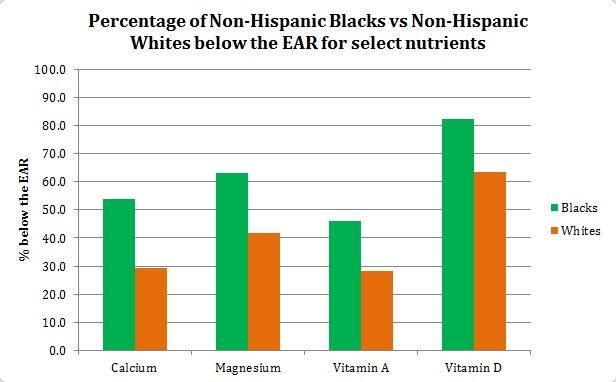Data from the National Health and Nutrition Examination Survey 2007–2010 indicated that 82% and 63% of non-Hispanic Blacks may be below the EAR for vitamin D and magnesium, respectively, compared with 63.5% and 42% of non-Hispanic Whites, respectively.
In addition, the percent of non-Hispanic Blacks below the EARs for calcium and vitamin A was also significantly greater than for non-Hispanic Whites across all ages, wrote researchers from Nutritional Strategies, Pharmavite, and Nutrition Impact.
“Our current observational findings show that a significant number of non- Hispanic Black American children and adults are not meeting recommendations for several vitamins and minerals,” they wrote in the Journal of Health Care for the Poor and Underserved. “This dietary behavior may have negative consequences for public health in the near future, especially when manifested in the early years leading to adulthood.
“As authoritative bodies convene on developing dietary and nutrient recommendations, specific strategies to increase consumption of vitamins and minerals in the US non- Hispanic Black population must be considered. As recommendations and their significance have been outlined by federal government agencies, dietary supplements, in addition to food and beverage consumption, may offer an additional option, and careful consideration can be made in collaboration with food strategies to elevate nutrient intakes and target nutrient inadequacy in culturally sensitive populations such as non- Hispanic Black Americans.”
Study details
The researchers analyzed data from 10,424 non-Hispanic White and non-Hispanic Black people aged four or older, who had reliable and complete 24-hour dietary intake data. The results indicated that a greater percentage of non-Hispanic Blacks were below the EAR for calcium, phosphorus, magnesium, and vitamins A and D compared to non-Hispanic Whites across all ages (see figure below).
“Nutrient shortfalls have been an issue addressed through dietary guidance for decades to encourage Americans to meet recommended levels,” said study co-author Dr. Victor Fulgoni from Nutrition Impact. “However, this analysis shows that little change is happening in nutrient intake and specifically, Non-Hispanic Blacks are at particular risk with significant nutrient shortfalls.”

The study was funded by Pharmavite, and Dr James Brooks, the company’s VP of Science, Technology and Quality and co-author of the paper, said: “We have supported many studies on nutrient shortfalls in the US population because we continue to see how important nutrient adequacy is in supporting health and wellness.
“It is important to improve consumption of nutrient-rich foods as the 2015 Dietary Guidelines Advisory Committee has recommended in its report; however, dietary supplements can also play a role in meeting nutrient needs especially for magnesium and Vitamin D.”
Vitamin D and cognitive decline
A study published this week in JAMA Neurology indicated that vitamin D deficiency and insufficiency may have “substantial” accelerating effects on cognitive decline in the elderly. The results amplify the importance of identifying vitamin D insufficiency among the elderly, particularly high-risk groups such as African-Americans and Hispanics, who are less able to absorb the nutrient from its most plentiful source: sunshine.
Baseline data showed 70% of African-Americans and Hispanics had low vitamin D, compared with 54% of Caucasians.
“Our data support the common occurrence of vitamin D insufficiency among older individuals,” wrote the authors in JAMA Neurology. “In addition, these data show that African American and Hispanic individuals are more likely to have vitamin D insufficiency or deficiency. Independent of race or ethnicity, baseline cognitive ability, and a host of other risk factors, vitamin D insufficiency was associated with significantly faster declines in both episodic memory and executive function performance, which may correspond to elevated risk for incident Alzheimer disease dementia.
Source: Journal of Health Care for the Poor and Underserved
Volume 26, Number 3, pp. 726-736, doi: 10.1353/hpu.2015.0098
“Comparison of Inadequate Nutrient Intakes in non-Hispanic Blacks vs. non-Hispanic Whites: An Analysis of NHANES 2007–2010 in U.S. Children and Adults”
Authors: Y. Papanikolaou, J. Brooks, C. Reider, V.L. Fulgoni

